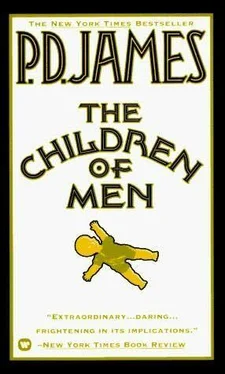I said: “I’m not attracted to gregarious death. Suicide should be like sex, a private activity. If we want to kill ourselves, the means are always at hand, so why not do it comfortably in one’s own bed? I would prefer to make my quietus with a bare bodkin.”
Jasper said: “Oh, I don’t know, there are people who like to make an occasion of these rites of passage. It’s happening in one form or another all over the world. I suppose there’s comfort in numbers, in ceremony. And their survivors get this pension from the State. Not exactly a pittance either, is it? No, I think I can see the attraction. Hilda was talking about it the other day.”
I thought that unlikely. I could imagine what the Hilda I had known would have thought of such a public exhibition of sacrifice and emotion. She had been a formidable academic in her day, cleverer, people said, than her husband, her sharp tongue venomous in his defence. After her marriage she taught and published less, talent and personality diminished by the appalling subservience of love.
Before leaving, I said: “It looks as if you could do with extra help. Why not apply for a couple of Sojourners? Surely you’d qualify.”
He dismissed the idea. “I don’t think I want strangers here, particularly not Sojourners. I don’t trust those people. It’s asking to get murdered under my own roof. And most of them don’t know what a day’s work means. They’re better used mending the roads, cleaning the sewers and collecting the rubbish, jobs where they can be kept under supervision.”
I said: “The domestic workers are very carefully selected.”
“Perhaps, but I don’t want them.”
I managed to get away without making any promises. On the drive back to Oxford I pondered how to frustrate Jasper’s determination. He was, after all, used to getting his own way. It looks as if the thirty-year-old bill for benefits received, the special coaching, the expensive dinners, the theatre and opera tickets, is belatedly being presented. But the thought of sharing St. John Street, of the violation of privacy, of my increasing responsibility for a difficult old man, repels me. I owe Jasper a great deal, but I don’t owe him that.
Driving into the city, I saw a queue about a hundred yards long outside the Examination Schools. It was an orderly, well-dressed crowd, old and middle-aged, but with more women than men. They stood waiting quietly and patiently with that air of complicity, controlled anticipation and lack of anxiety which characterizes a queue where everyone has a ticket, entry is assured and there is a sanguine expectation that the entertainment will be worth the wait. For a moment I was puzzled, then remembered: Rosie McClure, the evangelist, is in town. I should have realized at once; the advertisements have been prominent enough. Rosie is the latest and most successful of the television performers who sell salvation and do very well out of a commodity which is always in demand and which costs them nothing to supply. For the first two years after Omega we had Roaring Roger and his sidekick, Soapy Sam, and Roger still has a following for his weekly TV slot. He was—still is—a natural and powerful orator, a huge man, white-bearded, consciously moulding himself on the popular idea of an Old Testament prophet, pouring out his comminations in a powerful voice curiously given increased authority by its trace of a Northern Ireland accent. His message is simple if unoriginal: Man’s infertility is God’s punishment for his disobedience, his sinfulness. Only repentance can appease the Almighty’s rightful displeasure, and repentance is best demonstrated by a generous contribution towards Roaring Roger’s campaign expenses. He himself never touts for cash; that remains the job of Soapy Sam. They were initially an extraordinarily effective pair and their large house on Kingston Hill is the solid manifestation of their success. In the first five years after Omega the message had some validity, as Roger fulminated against inner-city violence, old women attacked and raped, children sexually abused, marriage reduced to no more than a monetary contract, divorce the norm, dishonesty rife and the sexual instinct perverted. Text after damning Old Testament text fell from his lips as he held aloft his well-thumbed Bible. But the product had a short shelf-life. It is difficult to fulminate successfully against sexual licence in a world overcome by ennui, to condemn the sexual abuse of children when there are no more children, to denounce inner-city violence when the cities are increasingly becoming the peaceful repositories of the docile aged. Roger has never fulminated against the violence and selfishness of the Omegas; he has a well-developed sense of self-preservation.
Now, with his decline, we have Rosie McClure. Sweet Rosie has come into her own. She is originally from Alabama but left the United States in 2019, probably because her brand of religious hedonism is oversupplied there. The gospel according to Rosie is simple: God is love and everything is justified by love. She has resurrected an old pop song of the Beatles, a group of young Liverpool boys in the 1960s, “All You Need Is Love,” and it is this repetitive jingle, not a hymn, which precedes her rallies. The Last Coming is not in the future but now, as the faithful are gathered in, one by one, at the end of their natural lives and translated to glory. Rosie is remarkably specific about the joys to come. Like all religious evangelists, she realizes that there is little satisfaction in the contemplation of heaven for oneself if one cannot simultaneously contemplate the horrors of hell for others. But hell as described by Rosie is less a place of torment than the equivalent of an ill-conducted and uncomfortable fourth-rate hotel where incompatible guests are forced to endure each other’s company for eternity and do their own washing-up with inadequate facilities although, presumably, with no lack of boiling water. She is equally specific about the joys of heaven. “In my Father’s house are many mansions,” and Rosie assures her adherents that there will be mansions to suit all tastes and all degrees of virtue, the highest pinnacle of bliss being reserved for the chosen few. But everyone who heeds Rosie’s call to love will find an agreeable place, an eternal Costa del Sol liberally supplied with food, drink, sun and sexual pleasure. Evil has no place in Rosie’s philosophy. The worst accusation is that people have fallen into error because they have not understood the law of love. The answer to pain is an anaesthetic or an aspirin, to loneliness the assurance of God’s personal concern, to bereavement the certainty of reunion. No man is called to practise inordinate self-denial, since God, being Love, desires only that His children shall be happy.
Emphasis is placed on the pampering and gratification of this temporal body, and Rosie is not above giving a few beauty hints during her sermons. These are spectacularly arranged, the white-clad choir of a hundred ranked under the strobe lights, the brass band and the Gospel singers. The congregation join in the cheerful choruses, laugh, cry and fling their arms like demented marionettes. Rosie herself changes her spectacular dresses at least three times during each rally. Love, proclaims Rosie, all you need is love. And no one need feel deprived of a love object. It needn’t be a human being; it can be an animal—a cat, a dog; it can be a garden; it can be a flower; it can be a tree. The whole natural world is one, linked by love, upheld by love, redeemed by love. One would suppose that Rosie had never seen a cat with a mouse. By the end of the rally the happy converts are generally throwing themselves into each other’s arms and casting notes into the collection buckets with reckless enthusiasm.
During the mid-1990s the recognized churches, particularly the Church of England, moved from the theology of sin and redemption to a less uncompromising doctrine: corporate social responsibility coupled with a sentimental humanism. Rosie has gone further and has virtually abolished the Second Person of the Trinity together with His cross, substituting a golden orb of the sun in glory, like a garish Victorian pub sign. The change was immediately popular. Even to unbelievers like myself, the cross, stigma of the barbarism of officialdom and of man’s ineluctable cruelty, has never been a comfortable symbol.
Читать дальше












